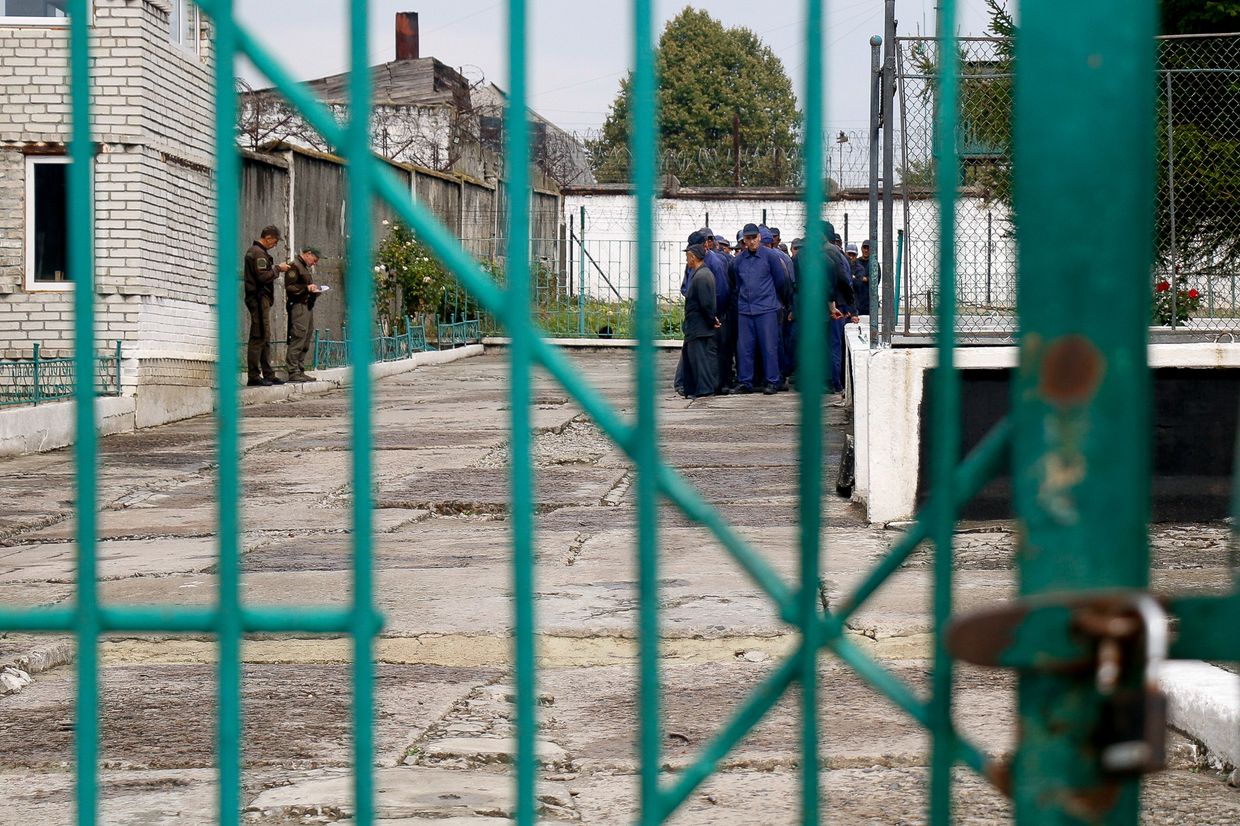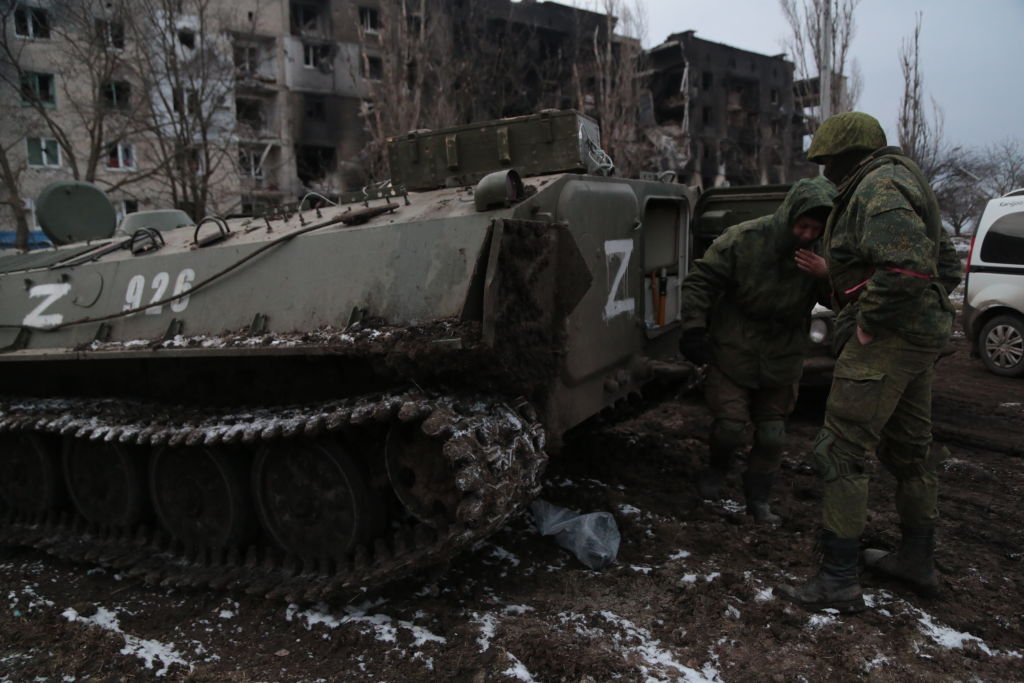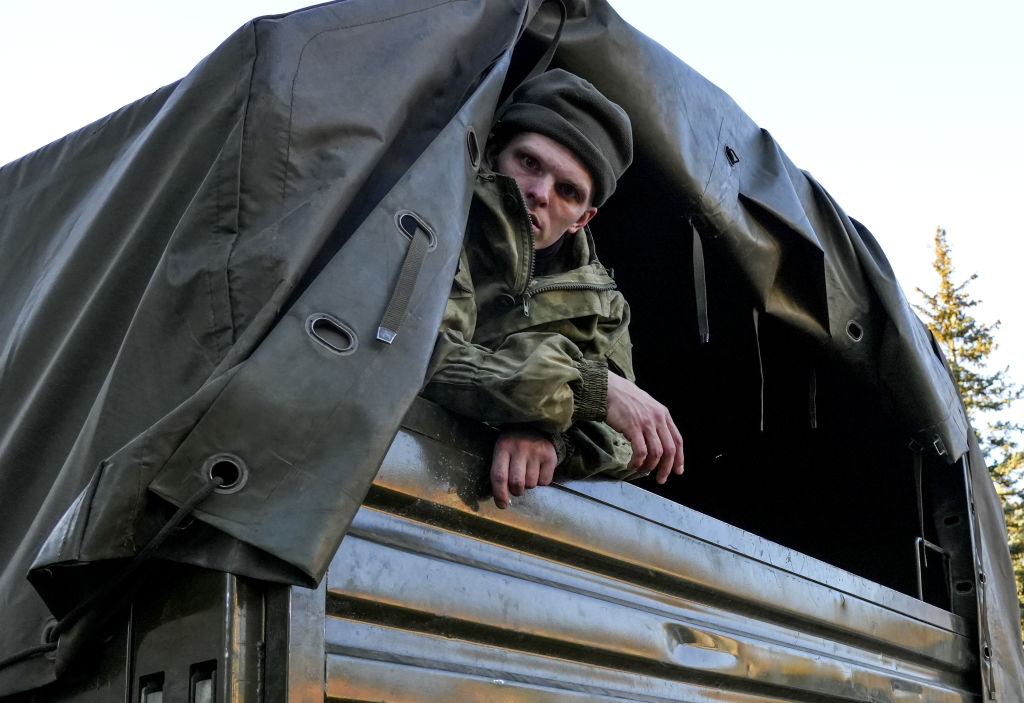'I never planned to fight against Ukraine:' Forcibly conscripted by Russia, Ukrainians await fate in POW camp

Editor’s note: The location of the prisoner of the war camp the Kyiv Independent visited is undisclosed for security reasons. The Kyiv Independent got vocal recorded agreement from the prisoners of the war to be interviewed and identified in the story.
When Yevhen Kalashnikov found an opening to surrender to Ukrainian troops in April, he made a run for it.
He says he darted hundreds of meters from a Russian trench across the muddy and churned-up battlefield waving a white t-shirt until he reached a Ukrainian position. As he ran, mortars landed and exploded all around him, he told a press conference in Kyiv in August.
Weeks before surrendering, Russia’s Security Service (FSB) conscripted Kalashnikov, a Ukrainian student, into the Russian army for publishing photos of a bridge used for Russian military logistics in his hometown of Novoazovsk in Donetsk Oblast, a town under Moscow’s control since 2014.
Once deployed to the front line in December 2022, Kalashnikov contacted the “I want to live” hotline set up by the Ukrainian government to allow Russian and forcibly conscripted Ukrainian troops to surrender. Unable to call the hotline, he came up with another escape plan.
“I’ve never planned to fight against Ukraine. This is my country. When I got into this, I already had a plan to surrender and proof of my innocence,” Kalashnikov told the Kyiv Independent during the press conference.
Following an investigation, Kalashnikov now claims a Ukrainian court has dropped all charges against him. Still a prisoner of war camp in western Ukraine, it is unclear when he will be set free.
While Russian prisoners of war have the chance to be exchanged, under Ukrainian law, forcibly conscripted Ukrainians caught while fighting for Russia can face lengthy prison sentences and even high treason charges for betraying their country.
And proving they were forcibly conscripted can be an impossible task, as the majority of them are caught on the battlefield in the middle of assault operations, keeping them behind bars.
“It's challenging to argue that someone was forcibly conscripted if they were actively engaged in combat for months without attempting to desert or surrender. In such cases, there is little reason for law enforcement to release such a captive,” Alyona Lunova, director of advocacy at Ukraine's ZMINA human rights center, told the Kyiv Independent.
“However, every detail must be proven."
Some of the forcibly conscripted Ukrainian prisoners of war held at a POW camp in western Ukraine told the Kyiv Independent they have already been convicted of 10 to 13 years in prison, whereas many others have been charged with treason and are waiting for online court trials to determine their fate.
Like all the Russian POWs, Ukrainians from the ranks of the Russian regular army have the option to be swapped to Russia or to stay in Ukraine to continue serving their term at the POW camp if convicted, Petro Yatsenko, spokesperson of Ukraine’s agency for the POWs treatment, told the Kyiv Independent at the detention center.
“I'm staying in Ukraine. To them, I'm already a traitor. I'll die there, I know that very well. I've already contacted them. I was prosecuted there. Here I can say what I want to say in peace,” Kalashnikov said.
Russia has reportedly conscripted tens of thousands of Ukrainian citizens in the occupied parts of Donetsk and Luhansk oblasts to fight against their own country — a war crime according to the Geneva convention — since it launched its full-scale invasion of Ukraine on Feb. 24, 2022.
Many of them are believed to have been killed in action, as the Kremlin reportedly uses these men as cannon fodder to expose Ukrainian artillery positions and to protect units recruited inside Russia.
Conscripted into Russia's army
In a video published on a pro-Russian Telegram channel last December, a long-haired, bearded man speaks on camera. His eyes appear to be reading a prepared text.
In the video, the man identifies himself as Yevhen Kalashnikov, stating that he "ridiculed Russia after being exposed to Ukrainian propaganda."
"To atone for my guilt, I am voluntarily joining the Russian army.” Accompanying the video is a photograph of Kalashnikov, only now with a buzz cut and in Russian military fatigues.
When Russia launched its full-scale invasion of Ukraine, Kalashnikov started an anti-Russian Telegram channel named “Funeral of our future,” informing subscribers of Russia’s war from inside occupied Novoazovsk and Donetsk, where he was studying.
Russia uses Novoazovsk as a logistics hub to deliver hardware and troops on the southern axes. The small town sits on the highway connecting Russia with Ukraine’s south, passing key occupied cities, like Mariupol, Berdiansk, Melitopol, and Henichesk.
At the time he created his Telegram channel, some 35 kilometers west of Novoazovsk Russian forces were leveling Mariupol. Kalashnikov’s father went missing, and his grandmother was killed during the city’s siege.
Kalashnikov says his videos of Russian military hardware being transported in occupied Novoazovsk were the reason Russia sent him to the front lines.
When Kalashnikov surrendered to Ukrainian forces in April, another forcibly conscripted Ukrainian from occupied Luhansk had already been at the POW in western Ukraine for over a year.
Oleksandr, who refused to provide his last name, received a call in late February 2022 with a draft notice telling him to go to sign up for the Russian military at a local Russian-controlled university — the same place where he worked as an English teacher.
Right before the start of the full-scale invasion, Russia established draft points across the occupied territories, summoning locals on the streets, workplaces, universities, and their homes.
Inexperienced with firearms, Oleksandr nonetheless signed a document that dispatched him to the front without proper training and equipment a month later.
“I didn’t have any choice,” Oleksandr told the Kyiv Independent in one of the offices at the POW camp, speaking in English.
Oleksandr redeployed with his Russian unit to Kharkiv Oblast in the early summer of 2022, where he served until being captured on the third day of the lightening Ukrainian counteroffensive that liberated the region last September.
After an investigation, a Ukrainian court sentenced Oleksandr to 13 years in prison with asset confiscation on treason charges.
When asked if he tried to contact the surrender hotline, Oleksandr called such a move “treason.”
"If I agreed to be a soldier (in Russia’s army), I have to continue," he said, adding that he wants to be swapped.
But since Russia has made no indication it intends to exchange Oleksandr, he is serving his term at the POW camp where he arrived over a year ago, Yatsenko said.
Ukrainians who defected to Russia’s side after 2014 and voluntarily joined the Russian or proxy armies are also at the camp, where they will stay unless Russia requests to exchange them or if they are not charged with war crimes.
Mykyta Lebediev from occupied Luhansk fought Ukraine with a Russian proxy army before the full-scale invasion. After being captured for a second time since 2014, he was charged with high treason and sentenced to 10 years in prison.
Serhii Prokhorov from Mariupol joined the Russian regular army after the deadly months-long siege and fall of his home city in Donetsk Oblast, both told the Kyiv Independent. He was charged with high treason and given a 15-year prison sentence.
They both say they want to be exchanged.
Surrendering through the hotline
When Russia declared its mobilization campaign last September, Ukraine preempted the move, initiating a surrender hotline with a tutorial and support.
From the third day of the full-scale invasion, the surrender mechanism idea was in play, with human rights defenders suggesting surrender options for their forcibly conscripted fellow countrymen.
"We already understood that (Russia) would grab everyone in the occupied territories," said Lunova, a human rights defender.
When a soldier, officer, or civilian who is about to be drafted by the Russian army contacts the Ukrainian hotline on WhatsApp, Telegram, or chatbot, he goes through a quick registration.
Yatsenko said that it is mostly the soldiers themselves who reach out, but families of conscripted soldiers do as well. Arranging the surrender of soldiers who contact the hotline is the priority, according to him.
Since the hotline was launched, every two days, one serviceman surrenders with the hotline. So far 215 requests have been processed and over 800 requests are in progress.
The best way for soldiers to surrender is by sharing the location of where they will be stationed in Ukraine before deployment. Once they arrive, they call the hotline to confirm their location.

After verification, the Ukrainian military sends the serviceman an escape plan to surrender.
“For us, it is much better to organize a surrender for a small group rather than one person,” said Yatsenko, spokesperson of Ukraine’s agency for the treatment of POWs.
Once everything is in place, oftentimes Ukrainian drones guide Russian soldiers through the minefields toward the spot of surrender. It is safe for the Ukrainian military to avoid ambush in case of feigned surrender.
“Every operation is unique,” said the spokesperson.
Yatsenko said the Ukrainian military does not disclose whether there have been incidents when Russian forces tried to take advantage of the surrender hotline to capture Ukrainian soldiers.
Kalashnikov wasn't able to reach the hotline from the front line as a commander had seized his phone.
But he took a risk and escaped the Russian position under heavy shelling just a day before his unit was about to start an assault on Ukrainian positions. That risk paid off.
After months in a POW camp in western Ukraine and court trials, Kalashnikov was transferred to a detention center in Kyiv. His mother fled Russian-occupied Novoazovsk, making the long journey through Russia, the Baltic States, and Poland to be reunited with her son, according to the “I want to live” hotline.
Kalashnikov is likely to be released.
"Someone (among forcibly conscripted Ukrainians) likely being released is positive, indicating that law enforcement has taken into account the observations of human rights defenders," said Lunova.













